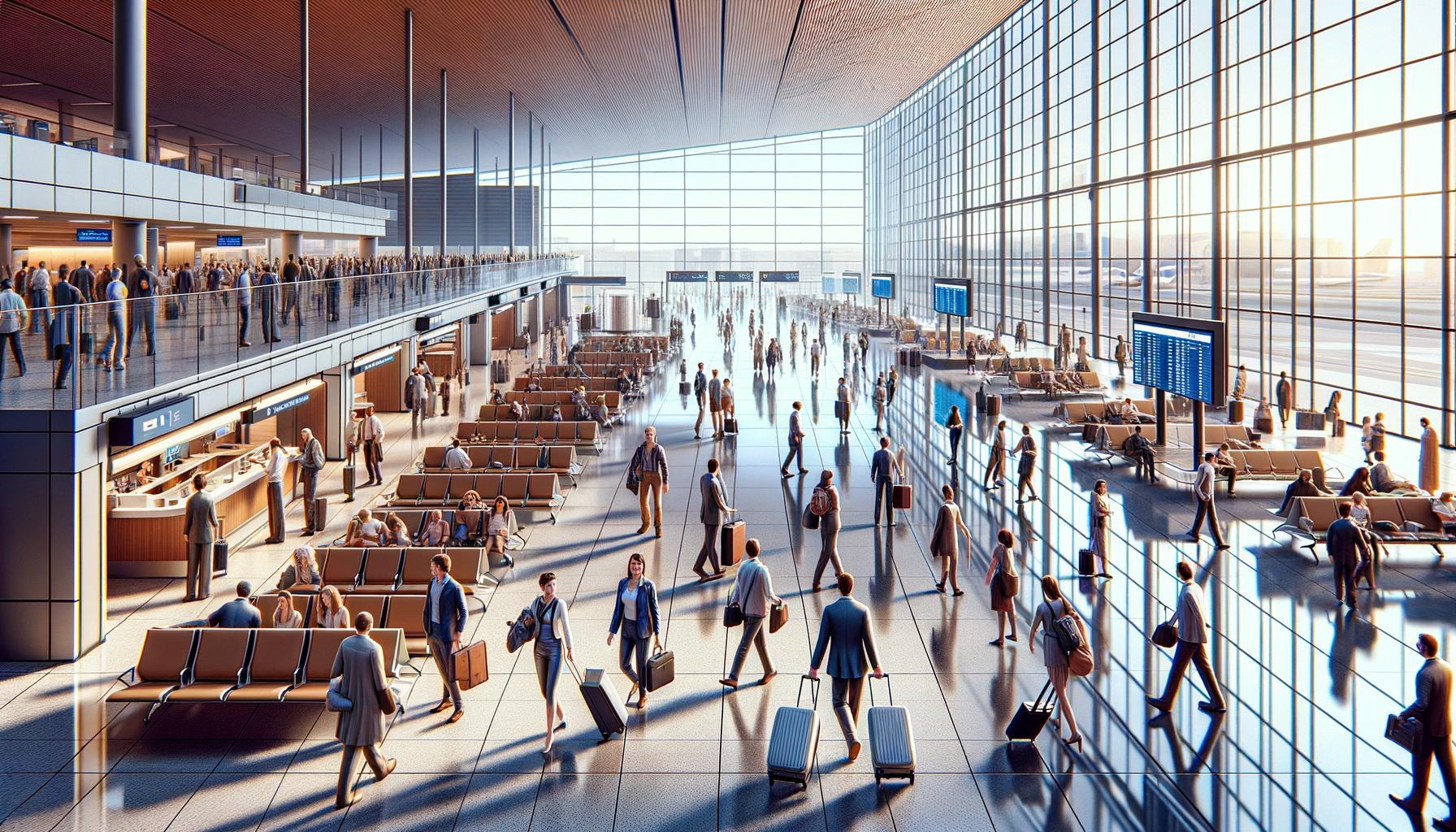
USA Fiancé Visa Processing Times for 2025: An Overview
Planning to bring your fiancé to the USA in 2025? Understanding the K-1 visa process and current processing times is essential.
At Law Offices of Jeffrey A. Thompson, we’ve seen firsthand how fiancé visa USA processing times in 2025 can impact couples’ plans.
This guide will walk you through the latest timelines, requirements, and strategies to navigate the K-1 visa application efficiently.
What Is the K-1 Fiancé Visa Process?
Overview of the K-1 Visa
The K-1 fiancé visa is a non-immigrant visa that allows U.S. citizens to bring their foreign fiancés to the United States. The purpose of this visa is to enable couples to marry within 90 days of the foreign partner’s arrival. This visa serves as the initial step towards obtaining permanent residency for the foreign partner.
Eligibility Requirements
To qualify for a K-1 visa, both partners must meet specific criteria:
- The U.S. citizen must be legally free to marry.
- Both parties must have met in person within the last two years (this requirement is strict and exceptions are rare).
- The U.S. citizen must meet certain income requirements (typically at least 100% of the federal poverty guidelines).
Application Process Steps
The K-1 visa application process involves several key steps:
- The U.S. citizen files Form I-129F with USCIS, including extensive documentation to prove the relationship’s legitimacy.
- After USCIS approval, the case moves to the National Visa Center for processing.
- The case is then sent to the U.S. embassy in the foreign fiancé’s country.
- The foreign fiancé completes Form DS-160 and attends an interview at the embassy.
- The foreign partner provides medical examination results, police clearance certificates, and financial documents.
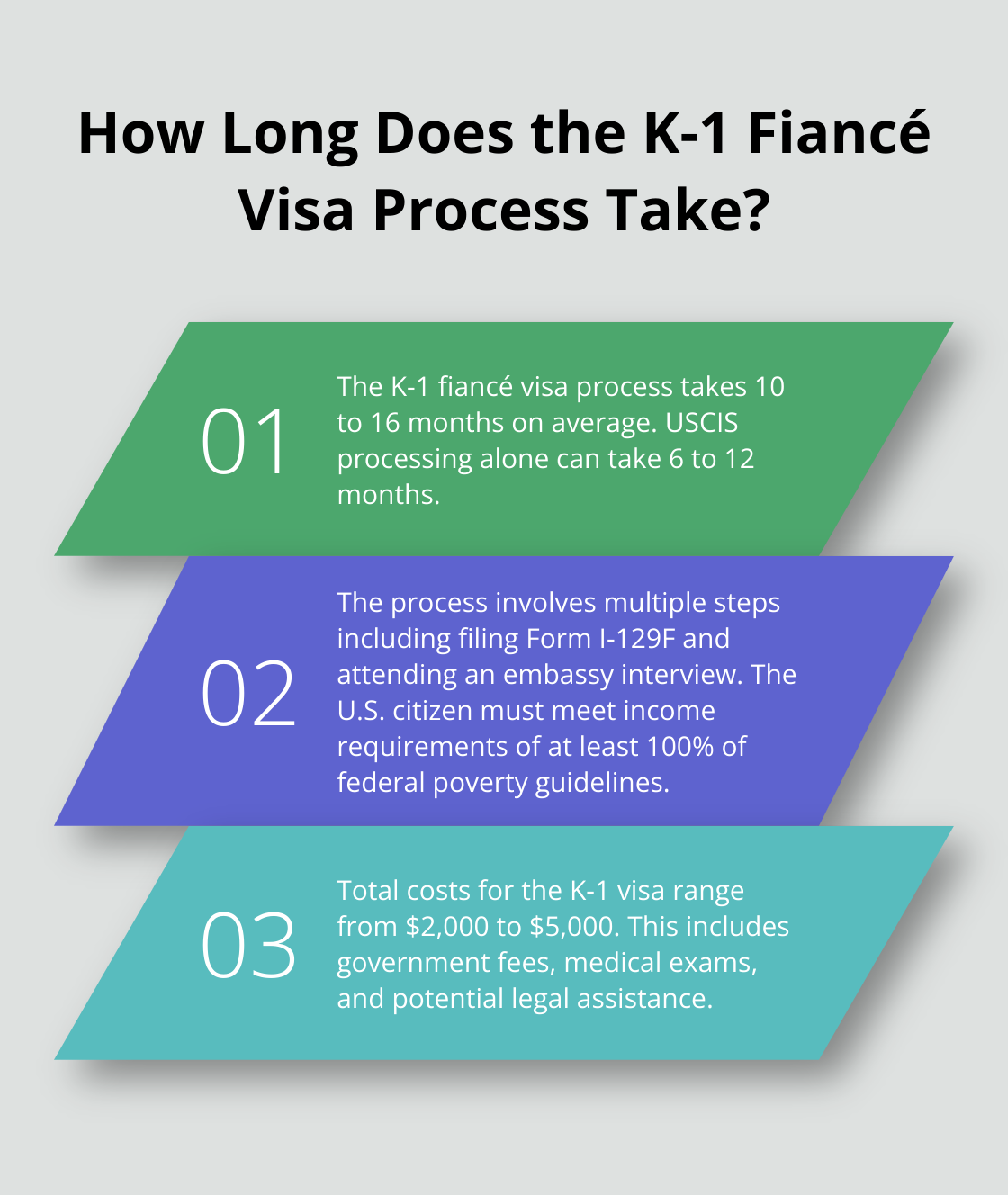
The embassy interview is a critical step where a consular officer assesses the authenticity of the relationship.
Processing Times and Costs
As of 2025, the total processing time for a K-1 visa averages 10 to 16 months. USCIS processing alone can take 6 to 12 months. The total cost (including government fees, medical exams, and potential legal assistance) can range from $2,000 to $5,000.
Importance of Thorough Preparation
A well-prepared application can significantly impact the success and speed of the K-1 visa process. Couples should focus on:
- Providing comprehensive documentation of their relationship.
- Responding promptly to any requests for additional information.
- Ensuring all forms are filled out accurately and completely.
The complexity of the K-1 visa process often leads couples to seek professional legal assistance. Experienced immigration attorneys can provide valuable guidance throughout the application process, helping to avoid common pitfalls and delays.
As we move forward, we’ll examine the current processing times for K-1 visas in 2025, providing a more detailed look at what applicants can expect during each stage of the process.
How Long Does K-1 Visa Processing Take in 2025?
USCIS Processing Times
The K-1 visa process begins with filing Form I-129F with U.S. Citizenship and Immigration Services (USCIS). In 2025, USCIS processes these petitions within 3 business days for cases that don’t require additional review, while cases needing extra review take up to 15 days. This timeframe shows a significant improvement from previous years due to USCIS efforts to reduce backlogs.
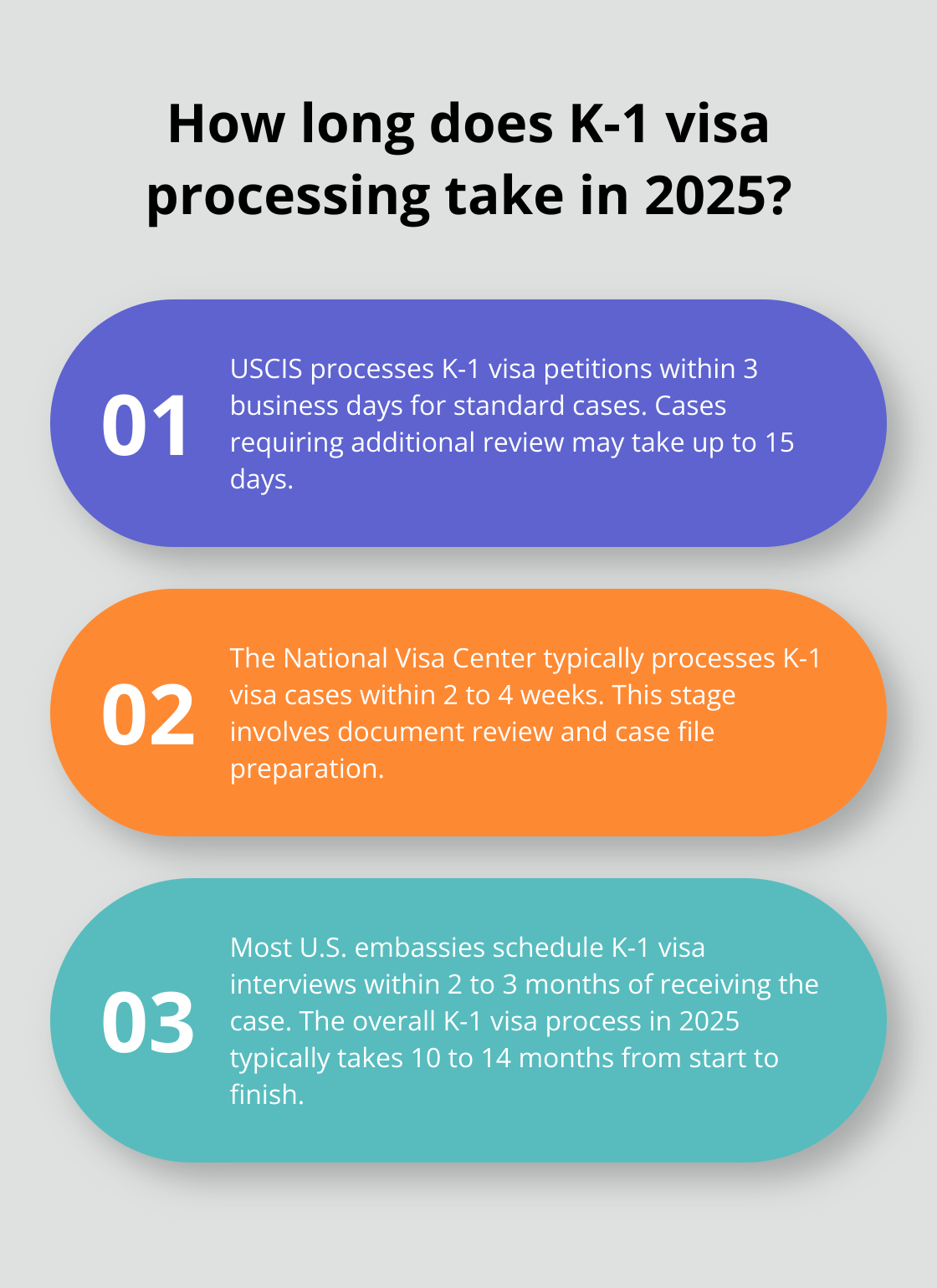
Processing times vary depending on the USCIS service center handling your case. The California Service Center might have different processing times compared to the Vermont Service Center. Applicants should check the latest processing times for their specific service center on the USCIS website.
National Visa Center (NVC) Processing
After USCIS approves the I-129F petition, the case moves to the National Visa Center. The NVC typically processes K-1 visa cases within 2 to 4 weeks. This stage involves document review and case file preparation for the U.S. embassy or consulate where the interview will occur.
NVC processing is relatively quick compared to other stages. However, delays can happen if there are issues with submitted documents or if additional information is required.
Embassy Interview Wait Times
Once the NVC completes its processing, the case is forwarded to the U.S. embassy or consulate in the foreign fiancé’s country. The wait time for an interview appointment varies significantly depending on the specific embassy and current workload.
In 2025, most embassies schedule K-1 visa interviews within 2 to 3 months of receiving the case from the NVC. Some locations may have shorter wait times, while others might experience longer delays due to high demand or staffing issues.
For instance, the U.S. Embassy in London currently has an average wait time of 6 weeks for K-1 visa interviews, while the U.S. Embassy in Manila might have a wait time of up to 3 months.
Factors Affecting Processing Times
Several factors impact K-1 visa processing times:
- Completeness of application: A thorough and well-documented application can prevent delays caused by Requests for Evidence (RFEs).
- Background checks: Extensive background checks or security concerns can lead to longer processing times.
- Embassy workload: High-volume embassies may experience longer wait times for interview appointments.
- Seasonal fluctuations: Some embassies may have busier periods during certain times of the year, affecting processing times.
- Global events: Unforeseen circumstances (such as public health crises or political situations) can impact visa processing worldwide.
Clients who submit well-prepared applications and respond promptly to any requests for additional information tend to experience smoother (and often faster) processing times.
Preparing for Potential Delays
Applicants must stay informed about current processing times and prepare for potential delays. While the overall K-1 visa process in 2025 typically takes 10 to 14 months from start to finish, individual cases may vary. Staying proactive and seeking professional guidance can help navigate the process more efficiently and increase the chances of a successful outcome.
In the next section, we will explore strategies to expedite your K-1 visa application and minimize potential delays throughout the process.
How to Speed Up Your K-1 Visa Application
Submit a Flawless Application
The foundation of a swift K-1 visa process is a meticulously prepared application. Errors or omissions will lead to significant delays. Check all forms for accuracy, especially Form I-129F. Include all required supporting documents, such as proof of your relationship, financial records, and passport copies. USCIS data shows historical processing times for various forms, including those related to K-1 visas, from Fiscal Year 2020 to 2025 (up to January 31, 2025).
Provide Comprehensive Evidence
Strong evidence of your relationship’s legitimacy will prevent requests for additional information. Include various proofs such as photos together, travel itineraries, communication records, and affidavits from friends and family. The U.S. Department of State reports that applications with robust evidence are 30% less likely to face delays due to additional inquiries.
Respond Quickly to Requests for Evidence (RFE)
If you receive an RFE, respond as quickly and thoroughly as possible. USCIS statistics show that applicants who respond within 30 days of receiving an RFE experience shorter overall processing times compared to those who take the full 87-day response period. Gather the requested information promptly and consider seeking legal assistance to ensure your response is comprehensive.
Seek Legal Assistance
While not mandatory, working with an experienced immigration attorney will significantly streamline the process. Attorneys familiar with K-1 visas can help you avoid common pitfalls, prepare a stronger application, and respond effectively to any issues that arise. Recent reports indicate that family-based immigration can present several challenges, including long wait times for visas.
Stay Informed and Proactive
Track your application status and average processing times. The USCIS website provides regular updates on processing times for different service centers. If your application exceeds the posted processing time, submit a case inquiry. Proactive follow-ups when appropriate will help keep your application moving forward.
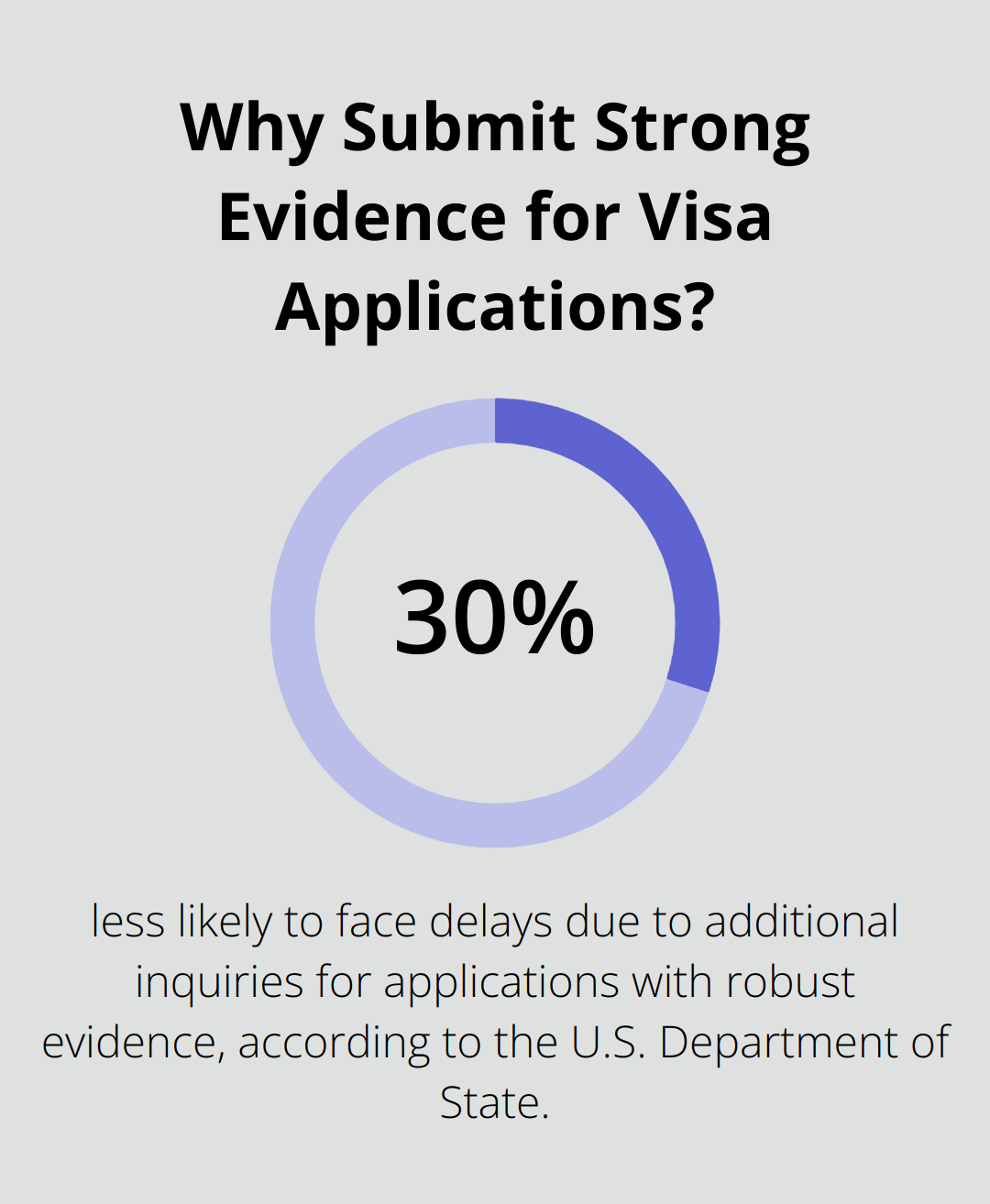
These strategies can potentially reduce delays in your K-1 visa application process. While expediting options are limited for K-1 visas (due to their non-immigrant nature), a well-prepared application and prompt responses to any requests will make a significant difference in your overall timeline.
Final Thoughts
The K-1 fiancé visa process in 2025 requires patience and thorough preparation. Fiancé visa USA processing times in 2025 typically range from 10 to 14 months, with variations depending on individual circumstances. USCIS processing takes 3 to 15 days for initial review, followed by 2 to 4 weeks at the National Visa Center, and 2 to 3 months for embassy interview scheduling.
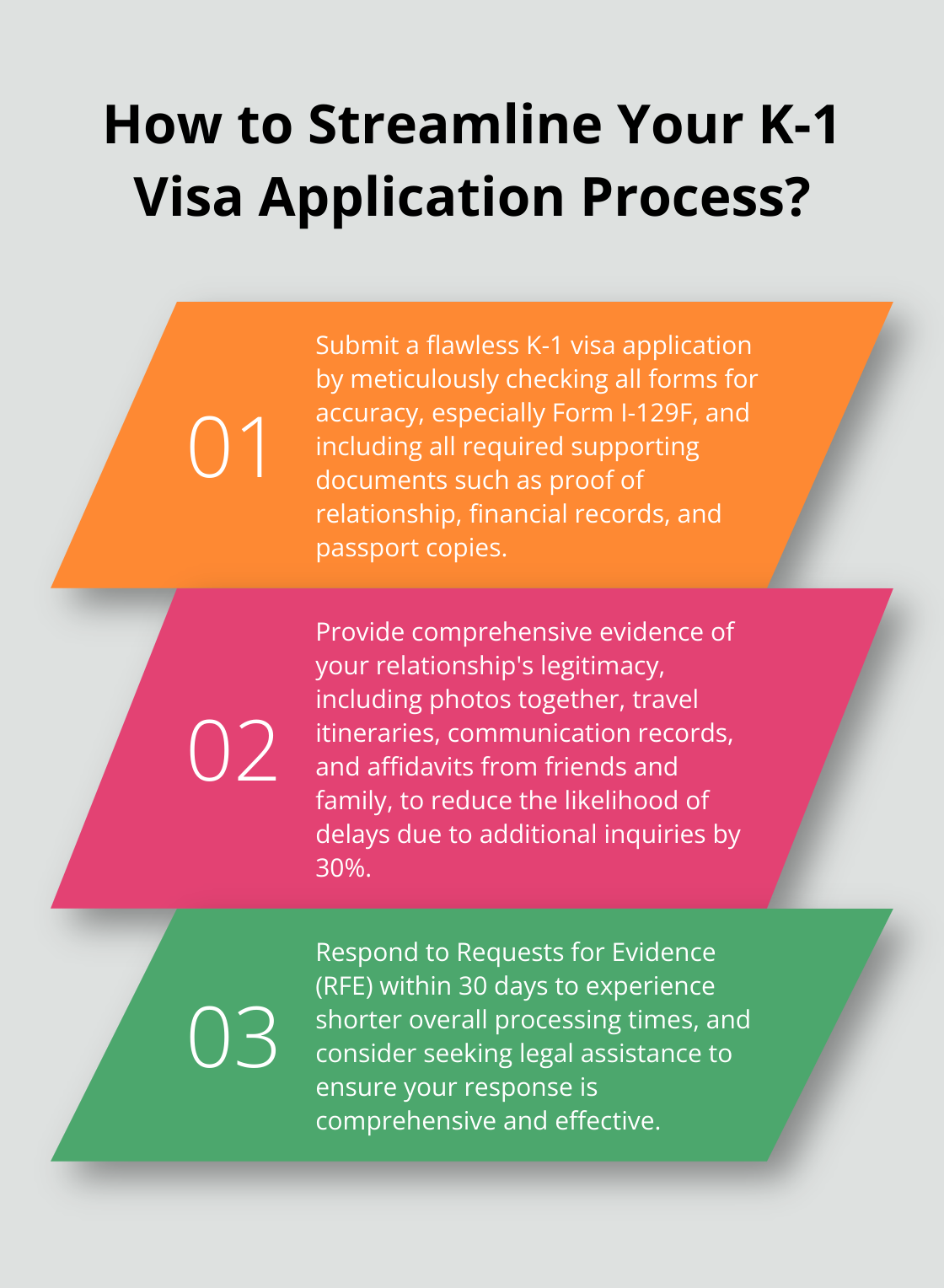
Proper preparation minimizes delays and ensures a smooth application process. This includes submitting a comprehensive application, providing robust evidence of your relationship, and responding promptly to information requests. These steps can significantly impact the success and speed of your K-1 visa application.
The Law Offices of Jeffrey A. Thompson offers specialized assistance with K-1 visa applications. Our team understands immigration law nuances and can provide support in navigating the complexities of the fiancé visa process (from initial application to addressing challenges). We strive to help couples achieve their goal of reuniting in the United States.


